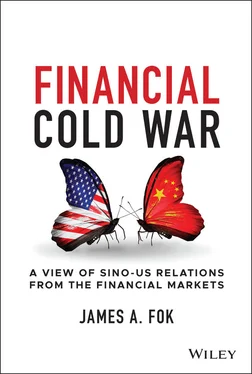In most parts of the financial services industry, the main challenges are to work out how to get something done and how to make money doing it. Due to their central position in the marketplace, exchanges and other market infrastructures that constitute the ‘plumbing' of the global capital markets overlap with regulation and policy to a much greater extent than other financial organisations. For regulators and policymakers, making money is only a secondary or even tertiary concern. What they care about are the rules of the game . Very subtle changes in these can have a huge bearing on a wide range of national interests.
Following China's economic rise over recent decades and emergence as a global power, there has been much speculation about a ‘gathering storm' in Sino-US relations. Academic and policy debate has raged over whether China and America can avoid the ‘Thucydides Trap'. This is the theory first posited by the ancient Athenian historian Thucydides in his History of the Peloponnesian War between Athens and Sparta (431–404 BC) that the fear of a rising power challenging the leadership of an incumbent power would inevitably lead to war. Indeed, in the majority of instances where a rising power has challenged the supremacy of the dominant power over the past five hundred years, war has followed – as in the case of Germany versus Great Britain in 1914. 1
In the euphoria of the years following the end of the Cold War, such a conflict between two major powers was almost unimaginable. And yet, in the wake of the 2008 Global Financial Crisis (GFC), we have seen a return to populist and nationalist politics, including the open expression of appalling prejudices, that had previously been unknown and regarded as unthinkable to my generation in the liberal democracies of the West. Brexit and the Sino-US trade war are conspicuous examples of this phenomenon, where public opinion and government policies have been heavily influenced by economic factors. At the time of writing, the full long-term effects of the Covid-19 pandemic are yet to be known, but tensions have been escalating.
This book is an attempt to synthesise the financial and economic factors that have brought us to our current predicament, analyse the geopolitical realities underlying financial markets today, and to suggest some solutions that balance the many varying interests, so as to avert the calamities that befell earlier generations. In this attempt, I am conscious of Maslow's caution that ‘It is tempting, if the only tool you have is a hammer, to treat everything as if it were a nail'. Financial markets cannot provide solutions to all the complex problems that arise in Great Power relations – indeed, policies that excessively favoured markets at the expense of communities may have contributed to many of the problems in the first place.
That said, I haven't yet come across an analysis that considers fully, from both a top-down and bottom-up perspective, how the global financial system as we know it today is contributing to geopolitical tensions. Even less attention is paid to the diverse range of policies, regulations, infrastructures and conventions that support it. Without an appreciation of these and the history of how the system has come about, it is difficult to understand the full scope of the systemic financial challenges facing the world's two leading powers, much less devise effective strategies for navigating the treacherous waters we're in.
A number of leading authorities from different fields have recommended a variety of paths that could lead to a peaceful rebalancing of the Sino-US relationship. This book does not try to usurp those, but to supplement their specific perspectives with a practical perspective from the field of financial markets. What I can say with confidence though is that, without addressing the sources of financial and economic tensions, it is unlikely that other sources of conflict can be eliminated. I hope this book might help increase mutual understanding and offer some insights to assist policymakers in both the East and the West in the extremely difficult task of smoothing the course of China's integration into the international financial system during a tricky period of geopolitical adjustment.
However, the book is not only targeted at policymakers. Be it in a liberal democracy or any other political system, leaders govern on behalf of their people. Every citizen has an interest in understanding the issues his or her country faces, so as to help ensure that leaders act in the best interests of society as a whole. The book has therefore been written in a way to make it accessible, without shying away from complexity. I hope it will be helpful in particular to those with an interest in international relations, finance, economic history, sociology and political science.
Being of mixed Chinese and British heritage, I owe my very existence to globalisation and to the particularly tempestuous period of history that created China and Hong Kong as they are today. This has undeniably influenced my viewpoints. Another stroke of serendipity that has enriched my outlook – and my life more generally – was to have met my wife Yeone, an American with a love of her country. Through her, I have had the opportunity to better understand the US and re-examine some of my preconceptions. Having had the privilege of experiencing the best – and, on occasions, the worst – of contemporary China and America, I have a deep affection for both countries. Moreover, our two young sons will grow up both Chinese and American and, if for no other reason, this alone gives me an enormous vested interest in seeing the two nations thrive in harmony with each other. Yet, putting sentimentality aside, I believe that setting the right policies depends on making objective assessments of the facts.
At this point, readers should note that I held positions of influence in Hong Kong's financial markets strategy and policymaking between 2012 and mid-2021. Through this, I was directly involved in certain Chinese policy steps towards financial markets internationalisation that are discussed in this book. While I have made every effort to maintain objectivity, where there are failings in this regard, I hope that readers will be compensated through the insights afforded by a first-hand perspective.
Over the course of human history, extreme inequality in the distribution of resources has tended to lead to conflict. The evolution of international trade and investment has, when conducted on the basis of sound rules and with the object of mutual benefit, raised humanity's collective standard of living and contributed to more peaceful coexistence between societies. Listening to the political rhetoric of late, it seems that some of our leaders may need a reminder of the lessons of history. This is my small contribution to that cause and I hope that readers will find this book entertaining, informative and thought-provoking.
That all said, I am an optimist and believe firmly that, if we can successfully navigate the next steps of global financial integration, we can all look forward to a bright era of greater prosperity and security. We have no choice. The alternative is simply not something we want to contemplate.
– James A. Fok
Hong Kong
10 September 2021
1 1.See (Allison, 2017).
My first thanks must go to my wife Yeone, who initially encouraged me to write this book as a way of passing some spare time while stuck at home during the Covid-19 pandemic. She probably hadn't imagined that it would become such an engrossing diversion as to cause me to neglect most of my familial duties for many subsequent months. As I disappeared (at least mentally) into the research and writing, she only very occasionally complained about having to shoulder most of the burden of looking after our five-year-old twins. On top of that, Yeone reviewed the first draft of each section, asked a ton of questions, and pushed me to add colour to illustrate my arguments. I hope that the final work at least partially justifies her sacrifices.
Читать дальше












